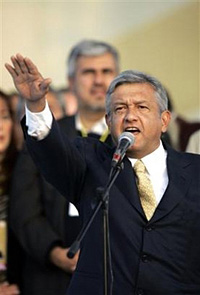
|
 |
 |
 Editorials | Opinions | May 2008 Editorials | Opinions | May 2008  
Could a Political Dilemma in Mexico Lead to Anarchy?
 Carlos Luken - MexiData.info Carlos Luken - MexiData.info
go to original


| | Andres Manuel Lopez Obrador (AMLO), refused to concede his 2006 election defeat and staged a series of demonstrations that sent Mexico City into urban chaos. | | |
Recent events in Mexico have again exposed the persistent malady that has plagued the country for the past decade and threatens to undermine its political future.

The existence of great political divisions is by no means new or strange in a country shedding the cocoon of autocracy and sprouting into a democratic state. In fact, many political thinkers predicted that confusion was to be the expected as an early transitional side-effect of the evolution. They were certainly proven accurate as the first opposition presidential term headed by Vicente Fox managed to survive by overcoming a series of concurrent crises that tested the opposition’s resilience and patience.

However in Mexico’s case, the transformation appears not to have been political evolution but social regression.

After almost ten years of opposition government, the country finds itself still hauling part of the cocoon it was supposed to shed. The 2000 elections provided evidence that Mexico was a much divided country in which the National Action Party’s (PAN) base proved to be the more developed and better educated in northern and conservative central states. In turn, the Democratic Revolution Party’s (PRD) main support was overwhelmingly concentrated in the populous capital Mexico City, and in almost all of the poorer and less developed southern states. While the once formidable Institutional Revolutionary Party (PRI) managed to save face by retaining some small pockets in very diverse regions.

The closeness of the 2006 election results not only recognized the existing divisions but also exacerbated the situation.

As is now well known, the PRD’s losing candidate, Andres Manuel Lopez Obrador (AMLO), refused to concede his defeat and staged a series of demonstrations that sent Mexico City into urban chaos. AMLO also seized his party’s leadership and proceeded to order a series of ional disruptions and deadlocks that all but paralyzed the legislative branch and threw a monkey wrench into President Felipe Calderon’s modernization initiatives.

Incredibly, although the country has a number of complex problems such as the war against crime; energy reform initiatives; stimulating the economy in order to create jobs and reduce poverty; the need to modernize its educational system and infrastructure; and involving itself in resolving the rapidly eroding US-Mexico relations originated by illegal immigration, narcotics and arms trafficking, and the shadow of a possible NAFTA renegotiation, Mexico’s major dilemma is political

Mexicans made their choice in the 2006 election. To analysts the results were clear, the choice was for continuing change and reform. But after almost two years this has not occurred, and the country is still struggling with many issues that were already vital five years ago and have now escalated to critical stages.

Without a doubt the main cause of Mexico’s stagnant situation is Lopez Obrador. AMLO, who many political observers see as a populist, liar, charlatan and agitator, is in reality an uninformed and uneducated anarchist who, after losing his presidential bid, managed to position himself as a political martyr surrounding himself with Mexico’s more sordid political elements and activists. His continuing tactics of presenting unproven accusations has been a successful tool in rallies and interviews. Recent TV advertisements, sponsored by “Mexico against Violence,” a private and non-partisan ONG, likened him and his power hungry tactics to Adolph Hitler’s and Mussolini’s.

The ads raised instantaneous cries of protest, mainly from the AMLO controlled PRD whose pressures prompted the Federal Electoral Institute (which purportedly had no jurisdiction over the matter) to order TV networks to repress their airing.

Although Lopez Obrador’s public appeal peaked during July 2006 (he was just half a percentage point from capturing the presidency), his unpopular mass demonstrations and public rants and ravings have made a severe dent in his reputation. Still, AMLO is popular among Mexico’s growing poor and the many disenfranchised casualties of the country’s economic crises.

In an effort not to alienate the PRD (currently the second political ional force), President Calderon has handled AMLO’s irresponsible antics with tolerance and patience. But considering the consequences, many now see this as a sign of weakness and timidity, a very perilous image problem for a leader traditionally perceived as the nation’s most important and powerful man.

Mexico has already been placed in the middle of a political tug-of-war between two men who have totally dissimilar backgrounds and purposes. And now it is being torn apart by a constitutional government that refuses to be pulled into a brawl with a negligent anarchist. With the country’s future at stake, it will be interesting to see who takes the initiative in solving this dilemma.

Carlos Luken, a MexiData.info columnist, is a Mexico-based businessman and consultant. | 
 | |
 |



